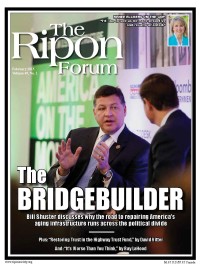Rarely is a problem best solved by adding layers of complexity to an existing process, particularly a budgetary process. Such is the proposal to supplement or replace the fuel tax with a mileage-based user fee to pull the Federal Highway Trust Fund back from the teetering edge of insolvency.
The real problem with the Trust Fund is how the money is being spent, more so than with how it is being collected from road users. While the nation’s roads and bridges decline further into disrepair, those who constitute the Washington, D.C. political establishment continue to fiddle.
In the 2007 report, “Paying at the Pump: Gasoline Taxes in America,” Jonathan Williams (then of the Tax Foundation) wrote, “. . . current federal highway legislation authorized over 6,000 earmarks from the Highway Trust Fund. Some of these went to legitimate transportation programs, but others were earmarked for items such as the infamous ‘Bridge to Nowhere.’ Today, gasoline tax revenue is spent on everything from public education and museums to graffiti removal and parking garages.”
At about the same time, the Transportation Review Board noted in its “Special Report 285” that, two years earlier, the federal government collected $107 billion in highway user fees, with the majority being generated from gas tax revenue. The TRB reported that only $85 billion of that total was devoted to highway spending.
The Trust Fund allocation process is little better today. Any discussion about the effectiveness of the fuel tax vs. a mileage-based user fee needs to start there, because any revenue collection method will be saddled with the same systemic problem. If only our legislators had the political will and self discipline to limit the incessant earmarking of transportation funds for non-highway projects.
Whether the mileage-based fee is determined by reading odometers or through uploaded tracking information, it does not apportion cost based on the road maintenance caused by specific vehicles that is a hallmark of the fuel tax.
That being said, the fuel tax is the simplest, most equitable method of charging motorists for the maintenance of our highway infrastructure. Heavier, less fuel-efficient vehicles contribute more to road wear and tear than do smaller passenger vehicles and motorcycles, but by virtue of higher fuel consumption their owners also pay more toward the Trust Fund.
A mileage-based user fee requires tracking of actual vehicle miles traveled. Recording the mileage is an added data collection step, either through periodic odometer inspections or by a much more intrusive GPS-based tracking system that monitors the whereabouts of each vehicle at all times. The GPS method opens the door for creative traffic management schemes such as charging drivers more per mile when they are navigating through congested traffic zones. Urban planning by way of social engineering. No thank you.
The loss of motorist privacy by GPS tracking would come with another hefty cost. Paying an estimated $50 to $100 to install the necessary hardware per vehicle for the 250 million registered cars and trucks on U.S. roads translates to a vehicle owner and taxpayer-absorbed cost of nearly $12.5 billion.
Whether the mileage-based fee is determined by reading odometers or through uploaded tracking information, it does not apportion cost based on the road maintenance caused by specific vehicles that is a hallmark of the fuel tax. Instead, the tax per vehicle mile would ostensibly be the same for an 18-wheel tractor-trailer as it would for a motorcycle; all this at the cost of introducing a new revenue collection system (and requisite overhead) to monitor and collect road user fees based on the distance vs. time profile of each vehicle.
Critics of the fuel tax point to electric cars and gas/electric hybrids as not consuming enough fuel to contribute their fair share to the Trust Fund. Through late 2014, 3.8 million plug-in electric and hybrid vehicles have been sold in the U.S. since introduction. That constitutes only 1.5 percent of the nation’s motorized traffic today. These vehicles are not part of the Trust Fund’s solvency issues and likely won’t be for several more years. If need be, owners of electric vehicles can be charged an assessment based on average miles traveled to make their contribution to the Trust Fund more equitable.
Index the federal fuel tax to inflation if you must. (The last adjustment to the per-gallon tax was over 20 years ago.) But do not take the existing and inherently fair method of charging drivers for highway use by vehicle fuel consumption and complicate it with a mileage-based user fee that adds new levels of cost, bureaucracy, and privacy concerns.
Gary Biller serves as President of the National Motorists Association.





